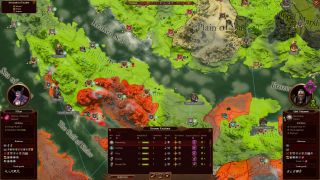Playing Slaanesh lets you get up to some real diplomacy shenanigans in Total War: Warhammer 3
The god of pleasure and pain is also god of getting away with all kinds of nonsense.

Slaanesh is Warhammer's god of excess. Sex, sure, but indulgence and vice and good things taken too far in general—a god of wine, drugs, fashion, decadent art, and throwing the best parties. When you play N'Kari, the greater daemon of Slaanesh in Total War: Warhammer 3, you get a blanket bonus to diplomacy with all factions. It's no surprise that everybody loves you. You're the popular kid whose parents have a swimming pool and don't lock the alcohol cabinet. Of course everyone wants to be your friend.
Diplomacy was a weak spot in the previous two Total War: Warhammer games that's finally been improved thanks to mechanics brought over from Three Kingdoms and Troy. A quick deal button lets you find potential trade partners or allies with ease, and a balance offer button lets you instantly pile on the necessary cash to make a deal go through rather than having to guess the amount (and then guess again when you get it wrong). Allies will build outposts to add to your garrisons and straight-up lend you their armies if you ask nice. There's an option to trade settlements too, meaning you don't always have to go to war over the one town you need to complete a province. I mean, I still did, but I didn't have to.

N'Kari is uniquely placed to engage with diplomacy thanks to a mechanic called Seductive Influence, which represents your sway over the various human and elven nations susceptible to your offers. Any kind of exposure to Slaanesh adds a few points of influence, whether that exposure's a diplomatic agreement, a cult in one of their towns, or even a battle. As it ticks up, corruption spreads through their lands and they get leadership penalties when fighting you. With enough influence you can dominate non-playable factions like the Norse and Warriors of Chaos, turning them into vassals with a single click.
Building a network of vassals and allies across the map is useful because something else new to Warhammer 3 is the option to recruit directly from allies. N'Kari's army is all about speed and has no ranged attacks bar some spells, but you can plug the gap by recruiting allied units. I like to march around with a couple of units of Tzeentch's blue horrors, who shoot balls of lightning, though in retrospect the flamethrowing pink horrors would be a better fit for my color scheme.
Another way to gap-fill is by tempting soldiers to change sides right there on the pre-battle screen. It took me way too long to figure this out because I assumed I'd have to unlock the ability first, but no, you just click on them, spend some Favor, and they're yours—though only for this fight. Being able to take multiple units right out of an opponent's pocket seems like a dick move, but the ultimate dick move is taking those units and, since they get returned after the battle, sticking them on the front line to ensure there are as few survivors as possible.
That alone would put me off wanting to take Slaanesh on in a straight-up fight, but there's more mischief yet. Any lord you defeat who escapes receives a Gift of Slaanesh, a party favor that provides various bonuses including more Seductive Influence as well as a boost to the number of devotees you earn every turn. Those devotees can be spent starting cults or summoning a disciple army, which spawns instantly but suffers attrition anywhere that doesn't have enough corruption. It's like a weaponized booze-up that goes on a rampage, then burns out when the hangover kicks in.

All the Slaanesh mechanics play to the theme. Even your research tree is hedonistic to the point of parody, representing the work of perfume houses who compete to create scents so potent they can somehow reduce spell cooldowns and unit upkeep. The descriptions for each odor read like the work of a professional wine snob, full of "floral top notes" and "lingering citrus mist".
The biggest gaming news, reviews and hardware deals
Keep up to date with the most important stories and the best deals, as picked by the PC Gamer team.
The Slaanesh-themed random events are just as ostentatious. One described corpses falling from the sky in a "hail of lithesome bodies", suggesting our god was bored of his playthings and throwing away old toys. To provide new entertainment I performed an opera for our enemies, gaining a diplomatic bonus with them. This event was called "It's Raining Men, Hallelujah!"

Even if you're not playing as N'Kari, Slaanesh's role as god of temptation and excess comes across. When you visit the Lord of Pleasure's realm to collect one of the souls needed to win the campaign, you're offered rewards in return for turning back. They get better as you descend this pit of concentric circles, which is shaped like Dante's version of Hell only more lurid and purple. You might be offered a chance to rank up every lord you have by 15 levels, or Slaanesh's Blade itself—a magic sword that adds +30 to attack, does +500 damage, gives you a 20% ward save, and makes you unbreakable. You might even be offered The Dark Prince's Paramour, who boosts control in all your provinces by 25, and can either reduce control in an enemy province by 50 or boost growth in a local province by 250 (!) points.
Going for Slaanesh's realm first so you can score something like that to carry you through the rest of the campaign seems like a pretty sweet deal. That's how they get you, since in the meantime some of the AI forces are out there getting other souls, putting you behind for the rest of the game.

Playing as Slaanesh is an interesting experience. You're not the best on the battlefield, though it's fun to deploy a bunch of whip-wielding marauder daddies as meat shields, tying up opponents so they can be flanked by faster units like daemonettes and chariots that presumably have bumper stickers saying "Slaanesh does it from behind."
Away from the battlefield is where you really shine. Like Cao Cao in Three Kingdoms, Slaanesh is as much about manipulating factions through diplomacy as eradicating them with force. The high elves in Warhammer 2 could do a little of that, spending influence to change how factions felt about each other like you were alternately playing matchmaker or some kind of rumor-mongering neighborhood gossip, though that's nothing compared to the kind of hijinx N'Kari can get up to.

While I was expanding across the Wastes, I realized the Tong faction controlled a settlement I wanted: The Writhing Fortress in The Blood Marshes, where I could construct a unique faction building called The Pandemournium to earn some extra control and growth. I would happily have traded another settlement for it, but they weren't interested in anything I had. So I declared war on the Tong, seduced four of the The Writhing Fortress's garrison units over to my side to help take it, then conquered the rest of the province without slowing down thanks to a disciple army I summoned on the spot. While the Tong furiously mustered for a reprisal in the next region over, I used the dominate ability to vassalize them. Now we're not only at peace, they pay me every turn for the privilege.
That's not something I could have done in either of the previous games or as any other faction. I'll miss those kinds of Slaanesh shenanigans when I'm playing someone who worships a more boring god, like "the concept of war" or "a bear, but real big".

Jody's first computer was a Commodore 64, so he remembers having to use a code wheel to play Pool of Radiance. A former music journalist who interviewed everyone from Giorgio Moroder to Trent Reznor, Jody also co-hosted Australia's first radio show about videogames, Zed Games. He's written for Rock Paper Shotgun, The Big Issue, GamesRadar, Zam, Glixel, Five Out of Ten Magazine, and Playboy.com, whose cheques with the bunny logo made for fun conversations at the bank. Jody's first article for PC Gamer was about the audio of Alien Isolation, published in 2015, and since then he's written about why Silent Hill belongs on PC, why Recettear: An Item Shop's Tale is the best fantasy shopkeeper tycoon game, and how weird Lost Ark can get. Jody edited PC Gamer Indie from 2017 to 2018, and he eventually lived up to his promise to play every Warhammer videogame.

Amazon's Mass Effect TV show now in 'active development' from the writer of F9: The Fast Saga (the one where a car goes to space)

Take-Two CEO says Grand Theft Auto 6 is on track for 'fall' next year, GTA 5 has sold over 205 million, and 'PC will be more and more a part of [our] business going forward'
Most Popular

